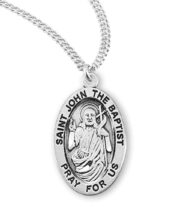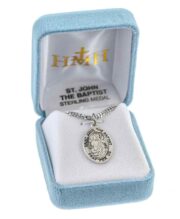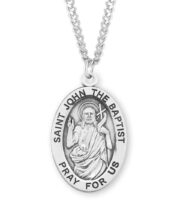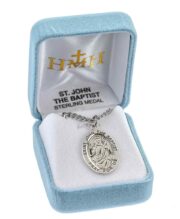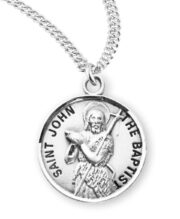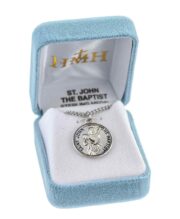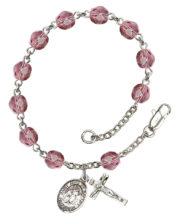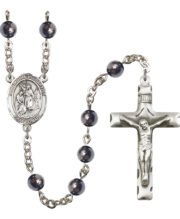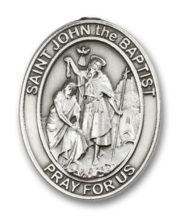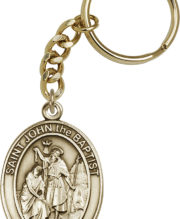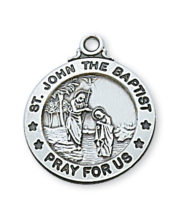Saints
St. John the Baptist
Biography of St. John the Baptist
St. John the Baptist is one of the most important figures in the history of Christianity. He was a prophet who announced the coming of the Messiah, Jesus Christ, and prepared people for his ministry by preaching repentance and baptism. He was also a martyr who died for his faith and his witness to the truth. In this blog post, we will explore the life of St. John the Baptist, from his miraculous birth to his tragic death, and learn more about his role and significance in God’s plan of salvation.
The Birth of St. John the Baptist
St. John the Baptist was born in the first decade before Christ, in Judaea, Palestine, near Jerusalem. His parents were Zechariah and Elizabeth, both of priestly descent and devout in their faith. They had been childless for a long time, and were advanced in age, when an angel of God appeared to Zechariah while he was serving in the temple. The angel told him that his wife would conceive and bear a son, whom he should name John. The angel also said that John would be filled with the Holy Spirit from his mother’s womb, and that he would be great in the sight of God. He would turn many people to the Lord, and go before him in the spirit and power of Elijah, to make ready a people prepared for the Lord (Luke 1:5-17).
Zechariah was astonished and doubtful at this message, and asked for a sign to confirm it. The angel replied that he would be mute until the day that his son was born, because he did not believe his words. Zechariah returned to his home, and soon after, Elizabeth conceived. She hid herself for five months, rejoicing in God’s favor and mercy (Luke 1:18-25).
Meanwhile, another angel appeared to Mary, a young virgin who was betrothed to Joseph, a descendant of King David. The angel told her that she would conceive by the power of the Holy Spirit, and give birth to a son, who would be called Jesus, the Son of God. He also told her that her relative Elizabeth was also expecting a child in her old age, and that nothing was impossible with God. Mary accepted God’s will with faith and humility, and said: “Behold, I am the handmaid of the Lord; let it be to me according to your word” (Luke 1:26-38).
Mary then went to visit Elizabeth in the hill country of Judah. When Elizabeth heard Mary’s greeting, she felt her baby leap in her womb, and she was filled with the Holy Spirit. She exclaimed: “Blessed are you among women, and blessed is the fruit of your womb! And why is this granted to me that the mother of my Lord should come to me? For behold, when the sound of your greeting came to my ears, the baby in my womb leaped for joy. And blessed is she who believed that there would be a fulfillment of what was spoken to her from the Lord” (Luke 1:39-45).
Mary responded with a song of praise to God, known as the Magnificat, in which she glorified God for his mighty deeds, his mercy, his holiness, his justice, and his faithfulness to his promises (Luke 1:46-55). Mary stayed with Elizabeth for about three months, until John was born.
When John was born, there was great joy among their relatives and neighbors. On the eighth day after his birth, they came to circumcise him according to the law of Moses. They wanted to name him Zechariah after his father, but Elizabeth insisted that he should be called John. They asked Zechariah for his opinion, and he asked for a writing tablet. He wrote: “His name is John”. Immediately, his mouth was opened and his tongue loosed, and he began to speak and praise God (Luke 1:57-64).
Zechariah then prophesied by the Holy Spirit about his son’s mission and destiny. He said: “And you, child, will be called the prophet of the Most High; for you will go before the Lord to prepare his ways; to give knowledge of salvation to his people in the forgiveness of their sins; because of the tender mercy of our God; whereby the sunrise shall visit us from on high; to give light to those who sit in darkness and in the shadow of death; to guide our feet into the way of peace” (Luke 1:76-79).
The people who heard these things wondered what kind of child John would be, and what the Lord had in store for him. The hand of the Lord was with him, and he grew and became strong in spirit. He lived in the wilderness until the day of his public appearance to Israel (Luke 1:65-80).
The Ministry of St. John the Baptist
St. John the Baptist began his ministry around the year 28 AD, when he was about 30 years old. He appeared in the wilderness of Judea, wearing a garment of camel’s hair and a leather belt around his waist, and eating locusts and wild honey. He preached a message of repentance and baptism, saying: “Repent, for the kingdom of heaven is at hand” (Matthew 3:2).
He attracted many people from Jerusalem, Judea, and the region around the Jordan, who came to hear him and confess their sins. He baptized them in the river Jordan, as a sign of their repentance and their readiness for the coming of the Messiah. He also warned them not to rely on their ancestry or their works, but to bear fruits worthy of repentance. He said: “Do not presume to say to yourselves, ‘We have Abraham as our father,’ for I tell you, God is able from these stones to raise up children for Abraham. Even now the axe is laid to the root of the trees. Every tree therefore that does not bear good fruit is cut down and thrown into the fire” (Matthew 3:9-10).
He also told them that he was not the Messiah, but only his forerunner. He said: “I baptize you with water for repentance, but he who is coming after me is mightier than I, whose sandals I am not worthy to carry. He will baptize you with the Holy Spirit and fire. His winnowing fork is in his hand, and he will clear his threshing floor and gather his wheat into the barn, but the chaff he will burn with unquenchable fire” (Matthew 3:11-12).
Among those who came to John was Jesus himself, who had left his home in Nazareth and traveled to Judea. When John saw Jesus coming to him, he recognized him as the Lamb of God who takes away the sin of the world. He said: “Behold, the Lamb of God, who takes away the sin of the world! This is he of whom I said, ‘After me comes a man who ranks before me, because he was before me.’ I myself did not know him, but for this purpose I came baptizing with water, that he might be revealed to Israel” (John 1:29-31).
Jesus asked John to baptize him, but John hesitated, saying: “I need to be baptized by you, and do you come to me?” (Matthew 3:14). Jesus answered: “Let it be so now; for thus it is fitting for us to fulfill all righteousness” (Matthew 3:15). Then John consented and baptized Jesus in the Jordan.
As soon as Jesus came up from the water, the heavens were opened and he saw the Spirit of God descending like a dove and resting on him. And a voice from
heaven said: “This is my beloved Son, with whom I am well pleased” (Matthew 3:16-17).
This was a sign that Jesus was anointed by God as the Messiah, the Son of God, and that he had begun his public ministry.
John continued to bear witness to Jesus as the Messiah, and encouraged his disciples to follow him. He said: “He must increase, but I must decrease” (John 3:30). He also confronted the religious leaders who opposed him and rejected his message. He called them a brood of vipers and exposed their hypocrisy and corruption (Matthew 3:7-10; Luke 3:7-14).
The Death of St. John the Baptist
St. John the Baptist also denounced the immorality of Herod Antipas, the tetrarch
of Galilee and Perea, who had married Herodias, his brother’s wife. John said to
him: “It is not lawful for you to have her” (Matthew 14:4). This angered Herodias,
who wanted to kill John, but Herod feared him and protected him, knowing that
he was a righteous and holy man. Herod also liked to listen to John’s preaching,
even though it perplexed him (Mark 6:17-20).
However, Herodias found an opportunity to get rid of John when Herod celebrated
his birthday with a banquet for his nobles and officers and the leading men of Galilee.
Her daughter Salome danced before Herod and his guests, and pleased him so much
that he promised her anything she asked for, up to half of his kingdom. Salome
consulted with her mother,.
Saints Similar to St. John the Baptist
You may also be interested in reading the Biography of St. John of Capistrano. Both saints shared the name John and were known for their roles as itinerant preachers. St. John the Baptist was a prophet, and St. John of Capistrano was a Franciscan friar. Next up: Biography of St. John Vianney
Also check out our handmade St. John the Baptist Medal and St. John the Baptist Rosary and St. John the Baptist Rosary Bracelet .

